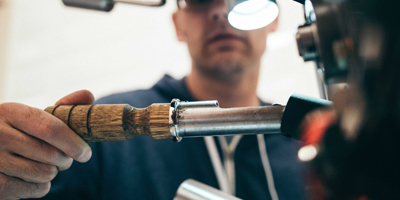BY TRACEY MACLEAN DOWDY PHCC CONTRIBUTING WRITER
Article pulled from PHCC official publication for plumbers, heating and cooling contractors.
It’s no secret that skilled workers are in high demand but in short supply across the trades. Industry leaders recognize that the best way to face this challenge is through the development of a highly trained workforce focused on innovation and growth. How do you cultivate such a staff? Look no further than your own employees and industry partners … and pair them with your newest recruits.
By creating a mentorship culture, companies ensure those entering the trades can draw on knowledge that classroom teaching alone cannot provide. Continuing education and experiential learning are the keys to training the next generation of tradespeople.
At its heart, a successful mentoring initiative has two primary elements: to reflect and reinforce the company’s strategies and vision, and to ensure long term sustainability and growth.
Training from Within
Those are two things that Tony Caruso, owner and president of AC Plumbing, Heating and Mechanical (ACP) in Cleveland, Ohio, understands. Every month, the company brings together its technicians for seminars and classes at its onsite training facility, building on the training and experience of ACP’s own team. Topics vary and often are based on real-life situations that have arisen in the field.
Along with the class or seminar being offered, the team sits down for breakfast together and enjoys a break from their busy schedules. Many of Northern Ohio’s old mansions are still heated by high mass steam and hot water systems, something that younger techs may not have encountered. Caruso explains that the opportunity to talk one-on-one with guys who’ve been out in the field for years gives the less experienced technicians the chance to ask specific questions about systems that may not have been covered in school.
Caruso spent years as a firefighter, simultaneously learning the plumbing trade, and the lessons he learned are invaluable. “Every day is a near-miss in the fire department. We train, we train, we train. There’s a culture of constant mentoring, teaching, learning from one another.”
Mentorship culture means the veteran has the opportunity to assess the strengths of the novices and guide them as they hone their skills and improve on their weaknesses. Not only do the veterans have the skill sets necessary to do the work, but they have an understanding of the culture and environment of a worksite and can the pass on these intangibles.
“We invest in continuing education and build on the knowledge that only comes from experience. If one guy runs into an issue on a job, next month that will be the topic we cover at school. Or, maybe we have one of our reps from [a supplier] come out and teach us about a new piece of equipment we’ll be using. They’re great; it’s mutually beneficial.”
– Tony Caruso, AC Plumbing, Heating and Mechanical

“We had the honor of installing this boiler at the Western Reserve Fire Museum in Cleveland, Ohio,” says Tony Caruso. “The boiler and all adjunct material were donated by Burnham Boiler, Becket Burner Inc. and Famous Supply. My sons, son-in-law and myself volunteered installation. That’s Gordon next to the boiler. He hangs with me every Thursday when he’s off from pre-school … my favorite day.”
Any construction tradesperson knows that effective communication on the jobsite is critical. For those new to the industry, however, learning to work alongside tradespeople from different fields can be challenging. Differing ages, personalities and skill levels need to be considered, as well as the ability to work in harmony to successfully meet deadlines.
Caruso’s role at ACP has morphed from leading the company into one of mentoring, as his children Anthony, Monica and Michael now run the day-to-day operations. “I tell my kids, you gotta run the business if you’re going to take it to the next level. You have to give back. You need to invest in the company and the community.”
Caruso is active in his local PHCC chapter; is a fire instructor, investigator and inspector; and teaches hydronic and steam courses at a local supply house. A particular favorite is “Near Misses,” an accident avoidance course that walks attendees through a common sense approach to the safety protocols that can sometimes get overlooked in the hustle of a workday.
ACP’s mentoring culture carries over into personal and long-lasting friendships with customers. “Our goal is to leave the customer with confidence in our work and the understanding of what exactly was done and why. By connecting the old and the new, the knowledge, relationships and level of trust between our customers and us is strengthened,” Caruso says.
“We aren’t the unlicensed guys working out of our trunk on a Sunday afternoon. We invest in continuing education and build on the knowledge that only comes from experience. If one guy runs into an issue on a job, next month that will be the topic we cover at school. Or, maybe we have one of our reps from Edelmans or Famous Supply come out and teach us about a new piece of equipment we’ll be using. They’re great; it’s mutually beneficial.”
The insight from a mentor also fosters an understanding of the need to show respect for the veterans’ experience and expertise. This respect is then reciprocated by those more seasoned professionals, enabling jobs to be done more efficiently, effectively and, most of all, safely.
Great mentors are those who are approachable. A mentorship culture is as equally dependent on the accessibility of the mentor as it is on their leadership qualities. By fostering an environment where employees aren’t afraid to ask questions, companies open the door to constant learning.
PHCC: Part of the Mentoring Process
Businesses that cite lack of time or lack of infrastructure to support a mentorship culture – or that possess the mindset that team members lack the necessary skills to be a mentor – are at risk of falling behind. Those who are intentional about pairing seasoned industry veterans with newcomers cultivate a culture of loyalty and consistent growth. It’s the age-old principle, “You reap what you sow.”






